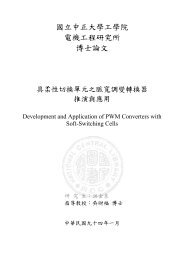Syntax of the Bi Comparative Construction in Mandarin Chinese
Syntax of the Bi Comparative Construction in Mandarin Chinese
Syntax of the Bi Comparative Construction in Mandarin Chinese
Create successful ePaper yourself
Turn your PDF publications into a flip-book with our unique Google optimized e-Paper software.
<strong>Syntax</strong> <strong>of</strong> <strong>the</strong> <strong>Bi</strong> <strong>Comparative</strong> <strong>Construction</strong> <strong>in</strong> Mandar<strong>in</strong> Ch<strong>in</strong>ese<br />
It is widely accepted that BCC concerns two clauses to be compared as CCs <strong>in</strong><br />
English (Fu 1978, Hong 1991, Liu 1998, X<strong>in</strong>g 2003). To take bi as a complementizer<br />
also <strong>in</strong>dicates that <strong>the</strong> bi-clause is adjo<strong>in</strong>ed later to <strong>the</strong> ma<strong>in</strong> clause. Compared items<br />
<strong>of</strong> different categories, such as NPs, VPs, PPs, and IPs (76), are actually CPs with<br />
gradable comparative predicates and undergoes some comparative ellipsis operation.<br />
When it comes to comparison, <strong>the</strong> compared items are required to be semantically<br />
parallel and mostly identical syntactic category so as to be <strong>the</strong> basis for <strong>the</strong><br />
comparison. Thus, <strong>the</strong>y may be taken as coord<strong>in</strong>ate structure. In Hong’s (1991)<br />
coord<strong>in</strong>ation analysis, sentences like (93) are comparison <strong>of</strong> NPs, and this coord<strong>in</strong>ate<br />
NP complex share a predicate nuli.<br />
(93) [[NP Zhangsan] bi [NPLisi]] geng ai yundong<br />
Zhangsan COM Lisi more love exercise<br />
‘Zhangsan loves exercise more than Lisi does.’<br />
However, <strong>in</strong> (94a), <strong>the</strong> coord<strong>in</strong>ate NP complex do not have a collective read<strong>in</strong>g so as<br />
to be <strong>the</strong> antecedent <strong>of</strong> <strong>the</strong> reflexive ziji <strong>in</strong> <strong>the</strong>ir common predicate. Yet, as we can see<br />
<strong>in</strong> (94b), Zhangsan and Lisi are subjects <strong>of</strong> different clauses that are compared, and<br />
thus <strong>the</strong>y do not share <strong>the</strong> same predicate and even <strong>the</strong> object reflexive ziji. Also, <strong>the</strong><br />
elements that bi takes can also have tense like (95). We can thus conclude that <strong>the</strong><br />
element that bi <strong>in</strong>troduces is a clause.<br />
(94) a. [[NP Zhangsani] bi [NPLisij]] geng ai zijii/j<br />
Zhangsan COM Lisi more love oneself<br />
‘Zhangsan loves himself more than Lisi does.’<br />
57<br />
中正大學 e-Thesys (94 學年度)





